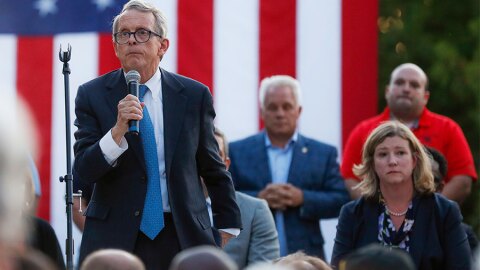On Monday, Ohio Gov. Mike DeWine laid out the details of his 17-point plan – – to address gun violence in the wake of the Aug. 4 mass shooting in Dayton that left nine dead and dozens wounded.
It is a plan, the Republican governor said, the Ohio legislature – dominated by his fellow Republicans – would vote to approve.
Really?This would be the same legislature that has been the property of the National Rifle Association and its bottomless pit of campaign dollars for what seems like forever?
Uh, guess again, governor.
I'm not quite sure why he says that – although some pieces, like the ones dealing with more resources for mental health services, which just might make some people less inclined to pick up guns and begin shooting innocent people, might have a chance.
A mandatory, universal background check for all gun sales was crossed out of STRONG Ohio because the governor did not believe he could push it through a legislature that is blissfully married to the NRA.
He's probably right.
But what the pro-gun legislators refuse to believe – or turn a blind eye to – is the fact that tougher gun control measures could become the law of Ohio.
All because of a little thing called the petition initiative, which is carrying on right now under the auspices of Ohioans for Gun Safety.
They plan to get legislation on the ballot either next year or in 2021 that would make mandatory, universal background checks for allgun sales the law of the land in Ohio, No ifs, ands or buts.
And guess what, folks? I'll bet you dollars to donuts that it passes.
What makes me so certain?
Well, a recent for one thing. It showed 90% of those polled favor mandatory background checks. And what about gun owners? Only 87% of them said they favor mandatory background checks.
"Unfortunately, the legislature is owned by the NRA,'' said Dayton Mayor Nan Whaley, a Democrat who is backing DeWine's plan, even though .
"We've seen a sea change in public opinion on gun control this year," Whaley said. "These legislators who are in bed with the NRA are way out of step with their own constituents."
The governor got his dose of reality in Dayton on the night of the shootings there.
That evening, when DeWine spoke at a rally of Daytonians mourning in a park near E. Fifth Street in the Oregon entertainment district, which was strewn with bodies just hours before, the crowd drowned out the governor with an angry, pleading chant:

DeWine was taken aback by the chanting, but said after the vigil, that the people were absolutely right – it was time to do something. Whaley was at his side and was encouraged to hear the governor promise action on gun control.
So for the next two months, DeWine worked with Whaley, other elected officials from cities all over Ohio, first responders, and organizations like the Buckeye Firearms Association, which advocates and lobbies for Second Amendment rights.
As little as one week ago, the governor was saying that he would that his version of a "red flag" law and expanded background checks would be part of his STRONG Ohio plan.
But when the plan came out in a Columbus unveiling Monday, his "red flag" law, which would allow the courts to restrict access to guns for people deemed to be potentially dangerous to themselves and others, was gone from the STRONG Ohio package.
It was replaced by an "enhanced safety protection order" which is built on the current "pink slip" law, which applies to people assessed by mental health experts in a psychiatric facility. It would require anyone found to be a danger to the themselves or others to turn over their weapons.
But what really gets the goat of most Ohio gun control advocates is that DeWine dropped his idea for expanded , including those at gun shows and private sales.
The two strongest pieces of gun control legislation were thrown overboard by the governor – presumably because he does not think he can get them passed by the legislature.
Whaley is prepared to support DeWine's plan, even though she believes strongly it should have gone further on background checks and the "red flag" law. She has little hope, though, that there is much of what DeWine is proposing that will make it to the governor's desk to be signed into law.
The Dayton mayor's friend and fellow Democrat, Cincinnati Mayor John Cranley, has had to deal with the aftermath of a massacre on Fountain Square on Sept. 6, 2018.
In that shooting, a gunman opened fire in the Fifth Third Center lobby that left three dead and two more wounded. Cincinnati police officers shot and killed the gunman within minutes of him opening fire.
in the fight for tougher gun control laws.
The Cincinnati mayor said he supports the legislation but agrees with Whaley that it should go further.
"I don't think we should make the perfect the enemy of the good,'' Cranley said. "This gun violence has to stop. We're tired of going to funerals."
Dennis Willard, a spokesman for Ohioans for Gun Safety, told WVXU his organization has never held out much hope that this legislature would take action on gun control legislation.
"We do appreciate the governor raising the level of the conversation,'' Willard said.
The petition drive to get the mandatory background checks on the ballot will go on, Willard said.
"When the governor was confronted by those people in Dayton chanting 'Do something' – that was serious,'' Willard said. "People want this. What politician would argue with something that 90 percent of the people want?"

Copyright 2021 91.7 WVXU. To see more, visit . 9(MDA5NTM4MTIyMDE0MTg3NDc2MTVlZjdmNQ001))





